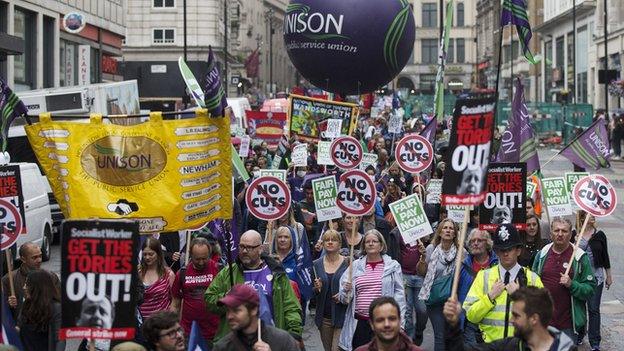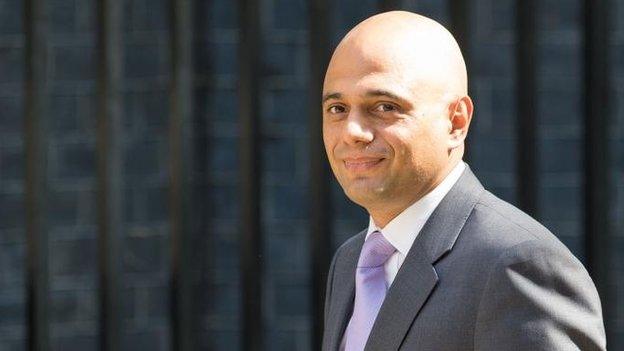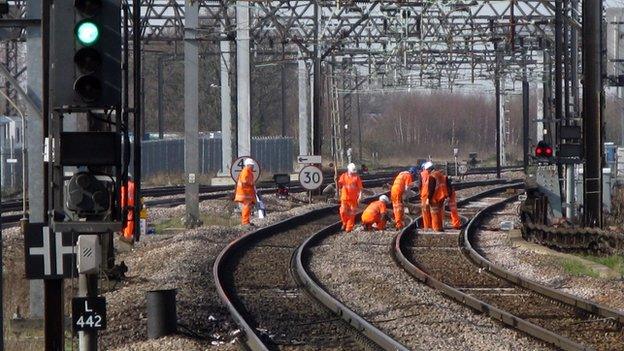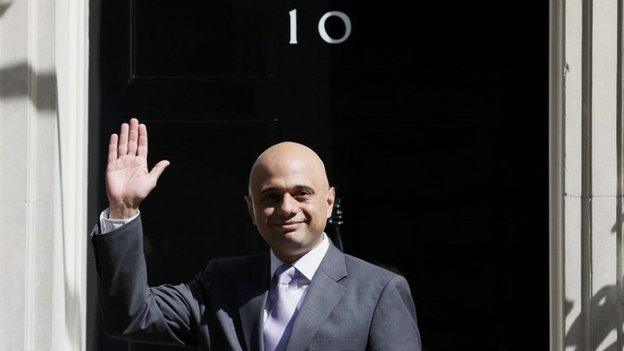Sajid Javid: Significant changes to strike law
- Published

Newly appointed Business Secretary Sajid Javid has said there will be "significant changes" to strike laws under the new Conservative government.
A strike affecting essential public services will need the backing of 40% of eligible union members under government plans, he said.
Currently, a strike is valid if backed by a majority of those balloted.
Unions said the plans "will make legal strikes close to impossible".
Mr Javid told the BBC's Today programme: "We've already made clear, in terms of strike laws, that there will be some significant changes... it will be a priority of ours.
"We need to update our strike laws. We've never hidden away the changes we want to make. I think it's essential to make these changes," he added.
A strike affecting health, transport, fire services or schools will need to be backed by 40% of eligible union members.
There will also need to be a minimum 50% turnout in strike ballots.
The government will also lift restrictions on the use of agency staff to replace striking workers, he said.
The changes to the law are to be announced in the Queen's Speech, he added, which will take place later this month.

Mr Javid said people were "fed up" of strikes that had not been properly supported by union members
Changes to trade union rules will be part of one of the first bills brought forward by the government, Mr Javid told BBC business editor Kamal Ahmed.
"The changes that we want to make to strike laws are... proportionate, they're sensible. If you look at other countries and what they've done they're not too dissimilar," he said.
The Conservatives had wanted to change strike rules during the coalition, but had been blocked by the Lib Dems, he said.
"What people are fed up of is strike action that hasn't been properly supported by the members of the relevant union.
"We've seen, including in the last five years, strike action that took place where perhaps only 10% to 15% of the members of that profession actually voted for it, and that's not right, it's unfair, especially when it comes to essential public services.
"Think of the impact it has - transport, health services - on ordinary people, going about their daily jobs - they should be in people's minds."
He said the alterations to the law would make it harder for people to go on strike.
"By increasing the thresholds it will certainly increase the hurdles that need to be crossed, but that's the right thing to do, it's the fair thing to do."

The Rail, Maritime and Transport Union said that trade unions would "unite to fight these attacks"
'Oliver Twist'
The TUC said the changes to the law would favour the UK's "worst bosses".
"This is a government not so much on the side of hard working people, but Britain's worst bosses - those who want their staff to be on zero-hours contracts, poverty pay and unable to effectively organise in a union so that they can do something about it," said TUC general secretary Frances O'Grady.
"The government's proposals on union ballots will make legal strikes close to impossible. Union negotiators will be left with no more power than Oliver Twist when he asked for more.
"After five years of falling living standards, the prospects for decent pay rises have just got a whole lot worse."
The Rail, Maritime and Transport Union (RMT), which has voted to strike over pay and conditions, said that trade unions would "unite to fight these attacks".
"These proposed new laws would mean one form of democracy for the greedy political class and another for the organised working class," said RMT general secretary Mick Cash.
However, the CBI business lobby group said that "strikes should always be the result of a clear, positive decision by those balloted".
Katja Hall, CBI deputy director general, said: "The introduction of a threshold is an important - but fair - step to rebalance the interests of employers, employees, the public and the rights of trade unions.
"For nearly five years the CBI has been saying that recruiting agency workers to plug gaps during a strike is not about threatening strikers' jobs, but providing essential cover during periods of action so businesses can continue to serve their customers.
"The abolition of this restriction is long overdue."
- Published12 May 2015

- Published11 May 2015
